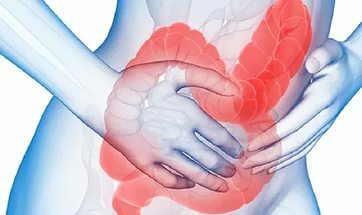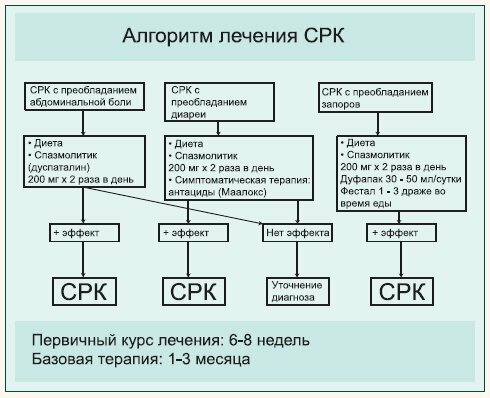Irritable Bowel Syndrome: Symptoms and Treatment

If a person is occasionally disturbed by diarrhea or constipation, abdominal pain, excessive gassing, but doctors do not diagnose tumors, infectious diseases or bacterial changes in the intestinal microflora, this condition is classified as irritable bowel syndrome( IBS).This condition is more common in people over the age of 40, but only 60% of patients seek medical help - most still get used to doing it on their own, taking specific medications or using funds from the category of traditional medicine.
Contents:Causes of irritable bowel syndrome
Despite numerous studies, doctors and scientists could not reach a single conclusion and did not determine the specific reasons for the development of the condition under consideration. It is commonly believed that the following factors can provoke it:
- Unstable psychoemotional background.It's about stressful situations that a person experiences with "enviable" regularity.It is noteworthy that in this case the patients fall into a vicious circle - the syndrome begins to manifest itself from stress and unmotivated irritation, and already against its background depression may develop.
- Intestinal motility disorder.Normally, in a healthy person, the intestines contract and relax in a certain rhythm, and if this rhythm is disturbed, the proportions of contractions and relaxations become wrong - this serves as a provocation of irritable bowel syndrome.In this case, no pathological processes will not reveal the examination.
- Breaking the hormonal background.Very rarely, but this factor can cause irritable bowel syndrome - for example, the condition under consideration draws women's attention during pregnancy or in the menopause.
- Diet disorder.Irritable bowel syndrome will surely bother people who in food prefer spicy, greasy dishes, in large quantities use coffee and strong tea, alcoholic beverages.
Do not forget about the hereditary factor - according to statistics, the condition in question is diagnosed 30% more often in patients who indicate such problems in their family.

Symptoms of irritable bowel syndrome
It is noteworthy that the symptoms of irritable bowel syndrome are identical to those of an intestinal infection - the disease can only be differentiated by a doctor after a specific examination of the patient.
Recommended to read: 
Symptoms of irritable bowel syndrome in case of predominance of diarrhea
Desires for bowel movements occur before meals, after meals and even during meals.Most often, patients notice such intense urges in the morning and in the morning.
Often, diarrhea occurs against the background of a strong emotional excitement - this condition in the people is also called a "bearish disease", because it is in these representatives of the fauna that diarrhea is a reaction to severe fright.
Patients feel severe pain in the navel, which occur immediately after bowel movement, and bloating will become characteristic.
Symptoms of irritable bowel syndrome with a predominance of constipation
Swelling and pain along the rectum can continue for a long time - according to some data up to 3 days, until there is a natural cleansing of the intestine.Moreover, pain in the rectum can be of the nature of colic, but they almost immediately disappear after visiting the toilet patient.
The chair changes its structure and becomes denser, physicians can classify it as "sheep's feces", and the patients themselves often observe in the feces the presence of white or transparent mucus.
Note: against a background of prolonged constipation, other symptoms may appear - for example, dry mouth, nausea and heartburn immediately after eating, and a decrease in appetite.But it all goes away as soon as the bowel is emptied.
Symptoms of irritable bowel syndrome - mixed version
In this case, diarrhea and constipation will alternate, but the leading sign remains pain along the rectum, similar to intestinal colic. In general, the characteristic symptoms of the mixed type of the condition in question are:
- spastic pains( rarely - stitching or aching) in the abdomen, which disappear immediately after bowel movement;
- disorder of the stool - diarrhea, constipation and their alternation;
- , when urinating on the bowel movement, the patient has a feeling that he will not be able to keep the feces in the gut;
- bloating, increased gas production;
- with defecation will be allocated white or transparent mucus.
How is irritable bowel syndrome diagnosed
If a person has had at least some symptoms of the condition in question, visit a medical institution and get advice from a specialist is absolutely necessary.First, the doctor will be able to establish the cause of irritable bowel syndrome - this will help to prescribe effective treatment.Secondly, it will be necessary to differentiate the examined state from other pathologies( due to the similarity of symptoms) - for example, from ulcerative colitis, rectal cancer, intestinal tuberculosis and others.
Studies conducted as part of the diagnosis of irritable bowel syndrome:
- coprogram - stool examination;
- general and biochemical blood test;
- sigmoidoscopy - examination of the intestine with the help of specific equipment( if necessary, clarifying the diagnosis);
- intestinal wall biopsy - only as directed by a physician.
The following symptoms may be cautious for the patient and the physician:
- Symptoms of irritable bowel syndrome are actively progressing;
- for the first time the manifestation of the disease was noted in the elderly;
- acute symptoms are present - irritable bowel syndrome is a chronic disease, acute course for it is atypical;
- blood is released from the anus during defecation;
- in the feces with the naked eye reveals the presence of fat;
- body temperature at the time of diarrhea and pain in the intestine rises;
- revealed lactose intolerance;
- the patient's weight is actively reduced;
- patient complains of a complete lack of appetite.
All these signs are completely uncharacteristic of irritable bowel syndrome and most likely indicate the development of severe pathology.
Treatment of irritable bowel syndrome
Therapy for diagnosing the condition in question is selected by the physician in a strictly individual order - the manifestations of the irritable bowel syndrome are different, and the help will be different. But first you need to understand one truth - if even the cause of the state under consideration is stress, irritation, but a person can not independently deal with them, then you need to seek medical help. Thus, several problems will be solved at once:
- the intestinal work will be restored;
- will come up with the ability to withstand stressful situations;
- stabilizes and normalizes the psycho-emotional background.
In general, the treatment of irritable bowel syndrome requires complex measures - only in this way it is possible to achieve the expected effect.

Diet for irritable bowel syndrome
No specific medical nutrition is prescribed for the diagnosis of the disease in question. But you will need to revise your diet / diet:
- Food portions should be small;
- the food should be taken at regular intervals;
- in no case be overeated.
If the irritable bowel syndrome is diarrhea, then the menu should limit the amount of vegetables consumed( beets, carrots, celery root, onions), and exclude apples and plums from the diet.
In the case of constipation on the background of the disease in question, it will be necessary to significantly reduce the consumption of fried, baked dishes, fatty meat, sandwiches, strong tea.
If the main problem with irritable bowel syndrome becomes increased gas formation, then the menu eliminates beans, corn, cabbage, all kinds of nuts, grapes, carbonated drinks and pastries.
In some cases, to normalize the intestinal microflora, the doctor can recommend taking a course of taking probiotics - Linex or Bifidumbacterin.These drugs will prevent the development of intestinal dysbiosis, which can make the symptoms of irritable bowel syndrome more intense.
Treatment with prevalence of diarrhea
It is dangerous to take constantly medications of an antidiarrheal action - this can lead to unpleasant consequences with getting to hospital treatment.Therefore, prescribe any medications for a diagnosed irritable bowel syndrome with predominance of diarrhea should only the doctor after a full examination of the patient.
Usually, during periods of exacerbation of the disease under consideration, when it is not possible to get rid of diarrhea even after adjusting the diet, the following medicines are prescribed:
- Smecta;
- Polysorb;
- Enterosgel;
- Polyphepan;
- Loperamide.
From folk remedies, you can use the skin of pomegranate, cherry fruit, alder bark and bird cherry fruit to treat diarrhea.These products are prepared in the form of broths and taken within 1-2 days until the full restoration of the intestine.
Treatment with predominance of constipation
There are quite a few drugs that help get rid of constipation and normalize bowel function. Here are just some of the most popular / famous:
- Laxigal;
- Guttalax drops;
- Portolac;
- Fibernex;
- Macrogol;
- Slight drops.
It is not bad to restore the work of the intestine and mineral waters with potassium ions - for example, Essentuki №17.
Recommended to read:For pains and spasms

The patient and his attending physician should establish the expediency of using antispasmodics and pain medication.The fact is that after the act of defecating pain, spasms in the intestine usually disappear.But in some cases, such uncomfortable sensations remain for a long time - specific medications will help.
What the experts recommend:
- Hyoscyamine;
- No-Shpa;
- Zamifenacin;
- Drotaverine hydrochloride;
- Spasmomen;
- Dimethicone;
- Polysilane.
Antidepressants in irritable bowel syndrome
This is a very difficult question - is it appropriate to use antidepressants when diagnosing the disease in question.It can be decided only by the attending physician in tandem with the psychotherapist!
As a rule, patients are prescribed amitriptyline, imipramine, bephol, trimipramine and / or phenelzine.
Note: if a dysbacteriosis is detected against the background of irritable bowel syndrome, then doctors will prescribe a therapy for this pathology.In this case, the patient should undergo a course of taking probiotics with antibacterial action.Such treatment lasts a maximum of 7 days, after which it is necessary to take medications that are able to restore the intestinal microflora - these are prebiotics Hilak forte or Lactulose.
Traditional treatment of irritable bowel syndrome
Since there is no infection, the treatment of the disease in question by purely folk remedies is entirely acceptable. The most effective recommendations / advice from folk healers were:
-
 Aromatherapy with peppermint oil - this will help to get rid of irritation, normalize the psycho-emotional background and even help to reduce the intensity of intestinal spasms.
Aromatherapy with peppermint oil - this will help to get rid of irritation, normalize the psycho-emotional background and even help to reduce the intensity of intestinal spasms. - Decoctions of chamomile medicinal and oak bark - they are taken inside for 3-5 days, help to get rid of diarrhea.
- Infusions of dill / fennel seeds, caraway seeds and anise drops - will help to get rid of increased gas formation, relieve spastic pain in the intestines.
- Decoctions of bark of buckthorn, yarrow leaves - it is advisable to use irritable bowel syndrome with constipation predominance.
- The leaves of the plantain and the bunches, blueberries, walnut leaves - will stop diarrhea.
Irritable bowel syndrome is hard to call a pathological disease - it is rather a specific condition of the body.And it does not matter which medications will be prescribed by a doctor - it is more important to learn how to control your emotions, normalize the rhythm of life, and adjust the diet.But such an approach in the treatment of diarrhea, constipation, pain in the intestines and increased gas formation can be used in practice only after passing a full survey of specialists.
Tsygankova Yana Aleksandrovna, medical reviewer, therapeutist of the highest qualification category



